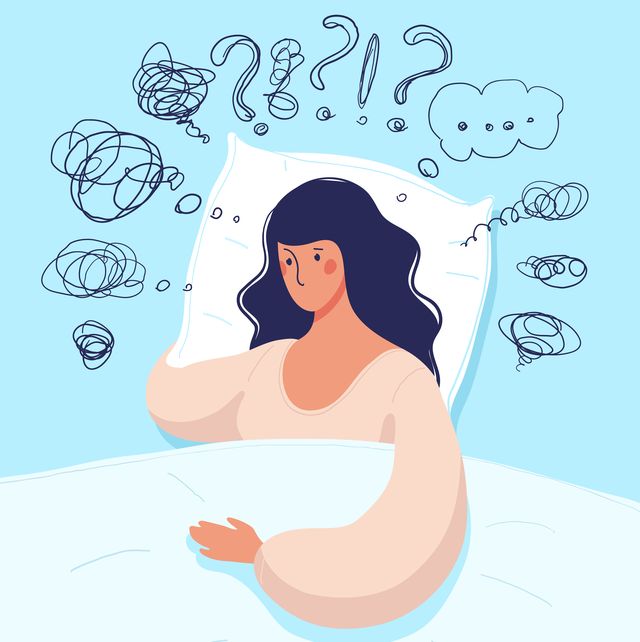How To Overcome Restlessness — Symptoms, Advice

Tatyana AntusenokGetty Images
Occasional restlessness is part of normal life but can sometimes be a sign of an underlying medical condition. Whether you can’t calm your mind or you want to keep moving, you may not notice how restlessness is affecting your body.
According to Kalms’ survey of more than 2,000 Brits, a whopping 95% said they suffered from anxiety. Defined as the discomfort that arises when something prevents us from relaxing or making progress, it can cause a person to do so feel tiredto have difficulty concentrating and feel like this Your mind is empty.
What is restlessness?
Experienced physically, restlessness is the need to move constantly, especially when sitting still at a desk or relaxing. We can also feel restless when we are active but not moving at the pace we would like.
The mental and physiological experiences of restlessness include trying to calm the mind and feeling hyperactive, anxious, or agitated. This in turn can cause tachycardia or insomnia.
People can also experience restless legs syndrome — an overwhelming urge to move your legs.
What are the 9 most common symptoms of restlessness?
- problems sitting still
- inability to concentrate
- Difficulty thinking through or finding solutions to problems
- Complaining a lot about the same problems
- frustration
- irritability
- agitation
- Mental complaints, including headaches, stomach upset and teeth grinding
- Finding difficulty falling or staying asleep
What is Restless Legs Syndrome (RLS)?
Restless Legs Syndrome (RLS) is a condition that causes an uncontrollable urge to move your legs. It can cause an uncomfortable tingling or crawling sensation in the feet, calves and thighs, according to the NHS. In some cases, RLS can be caused by an underlying health condition, such as iron deficiency anemia or kidney failure.
We speak to the experts to find out everything you need to know to overcome anxiety. Read on for the best tips.
How to stop feeling restless
1. Optimize your sleeping environment
“Everyone experiences anxiety sometimes. It can present itself in a number of ways and can be caused by conditions such as anxiety and depression, both of which have many other recognizable symptoms,” says Cheryl Lythgoe, senior physician at Benenden Health Country Life.
“A good night’s sleep is so important to your health and well-being, but it doesn’t always happen when you’re restless. Most importantly, make sure your bedroom is the perfect spot for a good nap. An ideal bedroom temperature is around 16-18 °C. Temperatures above 24°C can make you restless, while a cold room around 12°C makes it harder to fall asleep.”
According to the NHS, those who suffer from restless legs (or feel restless in general) should follow a regular bedtime ritual, sleep regularly and avoid caffeine late at night.
2. Learn to relax
It might be easier said than done, but learning to properly unwind can help you feel less restless. Relaxation techniques to master include mindful breathing, meditation, forest bathing, and yoga classes. Take some time each night to recharge your batteries: run a bath, read a good book, turn off your phone, go for a walk, or take up a new hobby like knitting or sewing.
3. Avoid alcohol before bed
“Stimulants can take hours to wear off and can have a big impact on how quickly you develop agitation — especially before bedtime,” says Cheryl.
“Detoxing from alcohol or drinking to excess, for example, can cause symptoms like restlessness and restlessness. When we drink alcohol regularly, the receptors in the brain gradually adapt to its effects. First, try to comply with UK safe drinking guidelines. This means not drinking more than 14 units of alcohol per week on a regular basis and spreading out the drinking by making sure you have non-drinking days.”
Why not have a herbal tea before bed instead?
4. Talk to your doctor
If you’re still struggling to get over the anxiety, the experts recommend booking a visit to your local doctor.
Cheryl adds: “Talk to your doctor about your symptoms as they may want to do a blood test as low iron levels or altered electrolytes could be to blame. Some lifestyle changes can be made to reduce the risk of iron deficiency, such as maintaining a healthy, balanced diet and eating more dark green leafy vegetables like kale and broccoli, iron-fortified cereals and breads, or meat and legumes like beans, peas, or lentils to eat.”












